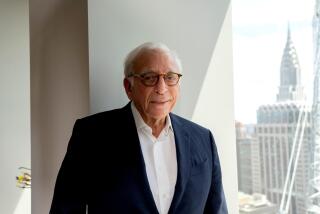Chrysler to Drop Union President’s Spot on Its Board
- Share via
Chrysler Corp. on Wednesday said it will eliminate five seats from its board, including the one held by United Auto Workers President Owen F. Bieber, thus ending the nation’s most prominent experiment in putting labor in the corporate boardroom.
The number of employee and union directors grew during the 1980s. But the movement was limited to a relatively few companies and was never fully embraced either by corporate executives or union leaders--though the UAW on Wednesday objected strongly to Chrysler’s action.
“American management seems to be very lukewarm about the idea, and American unions seem to be totally disinterested, except when they own big portions of the company,” said Joseph Blasi, who studies labor issues at Rutgers University. “So, there is no one asking for it.”
The nation’s No. 3 auto maker said it will ask shareholders in May to shrink its 18-member board to “improve efficiency” and reduce expenses.
In a statement, Bieber said he “advised Chrysler it was a grave mistake to remove the UAW seat from its board and obviously did not vote for the board’s recommendation.”
While Chrysler denied that there was ever a seat on the board reserved for the UAW, Bieber said the denial was “ridiculous,” adding that he hoped his removal didn’t signal the end of labor representation on corporate boards.
“I think it’s important to companies and to workers,” Bieber said at a news conference.
But there was no fiery attack on Chrysler management or warning of dire consequences. The union leader said that management will be deprived of labor’s input but that the action “doesn’t represent any diminishment of the union’s ability.”
The proposed ouster of Bieber would end more than 10 years of UAW representation on the Chrysler board. Bieber succeeded former UAW President Douglas A. Fraser, who became a director after the union lobbied for the government bailout that rescued Chrysler in the late 1970s.
The company’s move comes at a time when Chrysler may need union help to make it through a recession that has dramatically cut its sales.
The union “will have less of a direct role at the highest levels of the corporation, and that could be a troubling message at the beginning of a downturn,” said Harley Shaiken, a professor of work and technology at UC San Diego.
The notion of board seats for worker representatives has been hailed by some as a necessary step toward improving labor-management relations in the face of stiffening foreign competition. The companies of many Western European nations, particularly Germany, often have numerous labor representatives.
But in America, management has often been reluctant to share power with labor, particularly at the highest levels of the corporation. For their part, many union leaders fear that they may be accused of cozying up to management when they support the idea of worker representatives.
“They would rather have trust and the right to collective bargaining than to be on the board of directors,” said Jerome M. Rosow, president of Work in America, a workplace research group in Scarsdale, N.Y.
As a result of such concerns, the notion of worker representation never took off--even where employees owned substantial portions of corporations.
In an upcoming book titled “The New Owners,” Blasi and co-author Douglas Cruz found more than 1,000 publicly traded U.S. companies with significant levels of employee ownership. But employee representatives sit on the boards of only three of the companies--Polaroid and two lesser-known firms.
To employees, “the board is seen as too distant, “ said Corey Rosen, director of the National Assn. for Employee Ownership, a nonprofit group in Oakland. Employees “want more day-to-day involvement.”
In most cases, making room for workers on the corporate board has not led to significant change. At Chrysler, for example, Bieber--and Fraser before him--often represented the lone vote against corporate measures, labor experts say
The UAW “gained early access to key information and the ability to raise the union’s point of view early on in the deliberations,” said Shaiken. But as non-management directors, the UAW presidents’ “ability to influence (has been) quite limited.”
Supporters of worker representation say both Chrysler and the UAW failed to take full advantage of the arrangement. The UAW never managed to gain more than one vote on the Chrysler board, though at one point employees owned about 25% of the company. The auto maker later bought out the employees’ share.
“The company nor the union made any serious attempt to use employee ownership to make for a more cooperative” relationship, said Blasi, who sits on the board of a steel company as a worker representative.
Jesus Sanchez reported from Los Angeles; Donald Woutat reported from Detroit.






